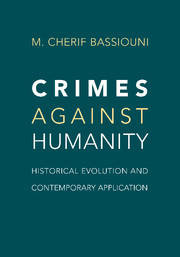Book contents
- Frontmatter
- Contents
- Preface
- Acknowledgments
- Table of Abbreviations
- Introduction
- 1 Legal Nature
- 2 Phenomenological Considerations
- 3 Emergence in Positive International Law
- 4 Post-Charter Developments
- 5 The Principles of Legality in the London Charter and Post-Charter Developments
- 6 Specific Contents
- 7 The Theories and Elements of Criminal Responsibility
- 8 Defenses and Exonerations
- 9 A Survey of National Legislation and Prosecutions for Crimes Against Humanity
- 10 Concluding Assessment: The Need for an International Convention
- Table of Authorities
- Table of Cases
- Index
- References
4 - Post-Charter Developments
Published online by Cambridge University Press: 05 July 2011
- Frontmatter
- Contents
- Preface
- Acknowledgments
- Table of Abbreviations
- Introduction
- 1 Legal Nature
- 2 Phenomenological Considerations
- 3 Emergence in Positive International Law
- 4 Post-Charter Developments
- 5 The Principles of Legality in the London Charter and Post-Charter Developments
- 6 Specific Contents
- 7 The Theories and Elements of Criminal Responsibility
- 8 Defenses and Exonerations
- 9 A Survey of National Legislation and Prosecutions for Crimes Against Humanity
- 10 Concluding Assessment: The Need for an International Convention
- Table of Authorities
- Table of Cases
- Index
- References
Summary
Mens aequa in ardius
Introduction
A number of international legal instruments that contain CAH provisions have been adopted since the London Charter, but so far, no specialized convention on CAH has been developed. Substantive post-Charter legal developments have all been part of the same continuum as the Charter, which remains the matrix for all internationally adopted legal formulations. Thus, to understand what has occurred since the London Charter, it is indispensable to understand what occurred before the Charter, and what occurred as part of the Law of the Charter (discussed in Chapter 3).
Some of the legal developments in CAH can be directly traced to the London Charter; others are a logical consequence of the development of ICL. These conventional law developments do not have the same legal weight, nor do they establish proscribing norms requiring states to individually and/or collectively enforce CAH. Some developments in the field of international human rights establish enforceable prescriptive norms giving rise to civil and administrative remedies, whereas others fall into the category of what is called “soft law” and are, in essence, standard-setting.
Post-Charter legal developments apply to the substance of CAH as well as to procedural or enforcement aspects related to ICL. There are also other substantive specific conflicts and institutions norms that encompass the same protected interests as CAH, such as: genocide, war crimes, torture, slavery and slave-related practices, and some aspects of terror-violence (terrorism).
Information
- Type
- Chapter
- Information
- Crimes against HumanityHistorical Evolution and Contemporary Application, pp. 167 - 295Publisher: Cambridge University PressPrint publication year: 2011
